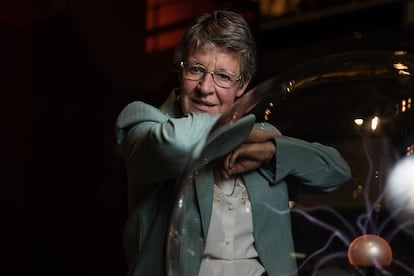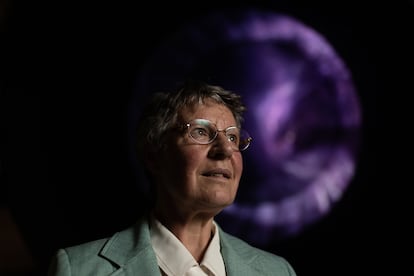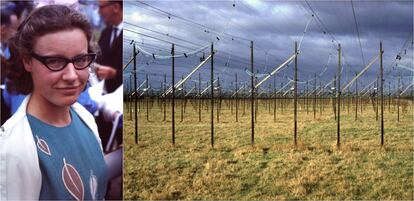Jocelyn Bell, astrophysicist, recalls the Nobel Prize that was denied to her: ‘I couldn’t afford to rock the boat’
In an interview with EL PAÍS, the expert spoke about her contribution to science – specifically, her discovery of radio pulsars – the sexism she faced in her career and how she managed to overcome imposter syndrome

In 1967, when she was a postgraduate student, Jocelyn Bell discovered pulsars – rotating neutron stars that give off pulses of radiation.
So astonishing was the regularity and precision of these signals that, for a few weeks, she and Antony Hewish, her thesis adviser, wondered if aliens were sending the signals. “Little green men” was the nickname that they gave the natural radio emissions.
It wasn’t easy for Bell to convince Hewish that the signal she had detected was real.
“Luckily, when I discovered my second pulsar, it seemed extremely unlikely that two aliens were trying to send messages at the same time, to the same planet using the same frequency from completely different locations,” Bell joked with EL PAÍS in an interview.
Before the discovery, she had spent the first two years of her thesis erecting an enormous radio telescope. Made up of cables running from 2,000 wooden poles, it covered an area as large as 57 tennis courts in the muddy English countryside just outside of Cambridge.
A few months after starting to use the telescope, Bell noticed a very small irregularity in her endless rolls of paper: a pen had drawn a red line, indicating where a signal had been received.
“I’m not sure that another student would have noticed half-a-centimeter, in kilometers,” she notes wryly.
In 1974 – seven years after the first pulsar was discovered – this groundbreaking discovery won the Nobel Prize in Physics. But Bell – by then a full-fledged astrophysicist – didn’t get any credit.
Last week, Bell, 79, passed through Barcelona, invited by the Museum CosmoCaixa to give a lecture to students. While speaking with EL PAÍS, she recalled her own years as a student in Northern Ireland, when she had to assert herself just to study what she loved.
“I knew that I wanted to do science… my parents had actually promised me that, when I got into secondary school, I would be doing science.”
However, at the start of high school, when the highly-anticipated first day of science class arrived, she was sent to the home economics classroom. Bell complained to her parents about what happened – they subsequently contacted two other families whose daughters also wanted to be in that class. In the end, they succeeded.
“We were the first girls in that school to study science. And, I think, the first girls that the teacher had ever taught!”
Things got even tougher when she entered the University of Glasgow to study physics.
“I was the only student in a class of 50 boys. Every time I entered [the lecture hall], the tradition was for everyone to whistle and beat their hands and feet against the wooden floors and desks,” she explains. “I had to learn not to blush, otherwise it would have been worse. When I returned to my student residence and told them that I was the only girl, my classmates thought that I would change course, because that’s what most women did. But I wanted to be an astronomer – I needed a physics degree.”
Bell hardly found any male allies at university. On the contrary: “The professors sometimes seemed like they wanted to join the [male] students. Fortunately, they never did.”

“Each week, we would have a visiting speaker. All my classmates raised their hands to ask questions: I kept quiet, so I could make myself invisible. I developed a strategy: I listened very carefully to the first five minutes of the talk, wrote down all the hypotheses that the researcher made and, at the end [of the lecture] asked: ‘Sir – yes, they were always men – you’ve made such and such assumptions. How would your conclusions change if they weren’t true?’ This impressed my professors.”
Only two of Bell’s university lecturers were women. “One gave us a mathematics course… the other taught physics, but she left after two weeks, she couldn’t take it. What the students did to me, they did to her, too.”
When she started her PhD at Cambridge, Bell suffered from imposter syndrome – something that affects many women, who are accustomed to being looked down on in male-dominated spaces. This made her very careful and detailed, especially in the turbulent months between the end of 1967 and the summer of 1968, when she finished her thesis while simultaneously discovering six pulsars.
“There has to be a lot of caution when you think that you’ve made an extraordinary discovery… it took my supervisor a little while to recognize that I was doing something important.”
According to Bell, one of the main factors that contributed to the discrimination she faced was that there were too few women at Cambridge.
“The women had to tread very, very carefully. I do remember how strictly we were warned not to get into trouble… to make sure we obeyed the dress code and things like that.”

Even when Bell received recognition for her discovery, the sexism persisted. She was always referred to as “the girl” – her boss was “the scientist.” Photographers asked him to pose seriously; she was asked to undo an extra button on her blouse.
“When I got engaged to be married – between the discovery of my second pulsar and my third pulsar – I noticed that people were congratulating me on my engagement, but not on my discovery. The expectation was that women would stay at home,” she laments.
For her, these were frustrating years. She had to follow her husband’s career and adapt accordingly. “We decided to have a child. In those days, there were no nurseries, since everyone thought that, if the mothers worked, the children would become delinquents.”
When asked how she managed these feelings, she admits that it was with “a bit of resentment. But I did manage to work part-time, and I had a number of very interesting jobs as an astronomer. I was fairly lucky in that I managed to stay in astrophysics. It wasn’t a standard research career – some of the time I was on the technical staff – but at least it kept me up-to-date in the field.”
One day, in 1974 – while preparing to launch a rocket from Kenya armed with an X-ray telescope – she received the news that her thesis adviser Hewish and his boss, Martin Ryle, had jointly been awarded the Nobel Prize in Physics. But not her.
Bell has always said that she was happy that her stars had made the Nobel Committee see that astrophysics was also a top-notch branch of physics. She wasn’t bitter – she realized that, after all, she was only a student at the time of her discovery.
“At the time, I had to make sure I was not seen as a troublemaker, because I needed the support of academics. If I had had a tenured job, I might have said something… I was in a very precarious situation and I couldn’t afford to rock the boat”
Bell was certainly aware of the unfairness of the decision, but preferred that her colleagues spoke up on her behalf. “My fellow students changed the word ‘Nobel’ to ‘No-Bell,’ playing with my name.”
Fred Hoyle – an esteemed British astronomer – expressed public outrage, but it was because he was at odds with her superiors over the Big Bang theory: “I was his ammunition. And I had to be careful not to be seen, to be approving of what he said.”

In the late-1980s, Bell’s son left home, and her husband left her to go live with another woman.
“For the first time in my life, I was able to start looking for a job because I liked it – not because it was where my husband was.”
She found a post at the Open University – a peculiar yet highly-regarded British institution, where the majority of students study off-campus.
“They made me head of the Physics department… it was particularly rewarding to teach adults in the afternoons, who were trying to keep their jobs while studying for their degrees in the evenings.”
She adds: “I think I earned my place once the pulsars were recognized… I gained self-confidence. I was able to put my energy to good use, but it could have broken me – it’s really how you respond, what you do after something like that happens to you.”
In 2018, she was awarded the Special Breakthrough Prize in Fundamental Physics. Bell has used the $3 million in prize money (three times what is awarded for the Nobel) to establish a fund to help female, minority and refugee students attain scholarships to become physics researchers.
“I’m not involved in the selection of the winners, but I do get to meet them afterwards. In the first year, there were four. In the second year, there were eight. In the third year, there were nine!”
In addition to teaching, research and philanthropy, religion is an important aspect of Bell’s life.
“The Quakers that I belong to are a very unusual denomination, very different from the mainstream churches. It’s a church that is un-dogmatic. It doesn’t say what you must believe… you have to work it out for yourself, based on your own experiences. There’s room for scientists.”
She explains: “The main guideline is that there’s a bit of God in everybody.”
The branch of astrophysics that now fascinates Bell the most is known as “astronomy of transient phenomena.”
“As our telescopes have gotten better, we don’t need to take long exposure shots. We can do many, many short exposures. And we’re finding that there are a lot of short timescale events that we just had no clue about before, because we [were dependent] on these long exposures.”
“There’s a lot of excitement trying to sort out what’s going on. There are these sudden flashes of radio emissions… and we don’t have a source. They must be coming from another galaxy. We don’t have a model yet, so it’s going to be a tough question to solve.”
From what we know about Jocelyn Bell, you can bet that she’s going to give it her best shot.
Tu suscripción se está usando en otro dispositivo
¿Quieres añadir otro usuario a tu suscripción?
Si continúas leyendo en este dispositivo, no se podrá leer en el otro.
FlechaTu suscripción se está usando en otro dispositivo y solo puedes acceder a EL PAÍS desde un dispositivo a la vez.
Si quieres compartir tu cuenta, cambia tu suscripción a la modalidad Premium, así podrás añadir otro usuario. Cada uno accederá con su propia cuenta de email, lo que os permitirá personalizar vuestra experiencia en EL PAÍS.
¿Tienes una suscripción de empresa? Accede aquí para contratar más cuentas.
En el caso de no saber quién está usando tu cuenta, te recomendamos cambiar tu contraseña aquí.
Si decides continuar compartiendo tu cuenta, este mensaje se mostrará en tu dispositivo y en el de la otra persona que está usando tu cuenta de forma indefinida, afectando a tu experiencia de lectura. Puedes consultar aquí los términos y condiciones de la suscripción digital.








































